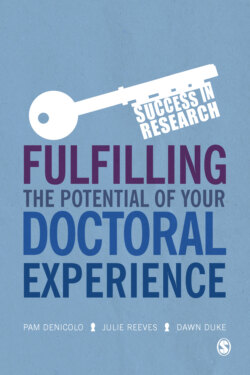Читать книгу Fulfilling the Potential of Your Doctoral Experience - Pam Denicolo - Страница 9
На сайте Литреса книга снята с продажи.
Prologue: Who Will Benefit from the Book and Why Who is this book for?
ОглавлениеThis book has been produced in response to the profound changes that have taken place in the research community in recent years. The three main authors and our guest chapter author share a passion for supporting the work of researchers, especially doctoral and early career researchers. We have all worked for many years in various capacities to further that ambition, and in so doing have learnt much from researchers about what they find helpful and what they find challenging. We have also witnessed tumultuous change in doctoral education over the last fifteen years or so, including increasing diversity of doctoral candidates, types and titles of doctoral degrees, and the nature and scope of the doctoral research process. Thus, we recognised a need not only to provide an up-to-date resource for our newer researcher community but also to acknowledge that the community itself has transformed and requires a different kind of guidance to that traditionally provided.
The doctoral research community no longer mainly consists of full-time, funded, quite young PhD students but spans a range of ages and experience, including many undertaking a professionally based research degree, and those who study on a part-time and self-funded basis. What has so far remained consistent is that the community includes people from a range of national backgrounds, in whichever country their study is based and whichever geographical context provides the venue for data collection. Given that our audience is diverse in multiple respects, we have attempted here to provide useful general guidance and stimulating ideas for all but with some special advice for specific groups or circumstances, such as part-time researchers, whenever a significant difference emerges. To illustrate ideas and points, we have included the voice of researcher experience both from guest contributors and as generalised and anonymised comments from researchers whom we have engaged with over the years. This book is not, though, a substitute for all the available books on specific aspects of the doctoral process, such as reviewing the literature, writing a thesis or developing transferable skills, nor does it intend to make redundant other books about the general doctoral process. Indeed, we will recommend many of them, or at least some sections of them, for further reading of specified topic areas.
Instead, this book takes a distinctive stance which we think is more appropriate for doctoral researchers of today and tomorrow. Before we explore that stance, please note that we will continue to address our main readership as doctoral researchers in recognition both of the diversity of named degrees on which they may be enrolled and of the special status which we think they deserve in the academy. Others may also find this book informative, especially those professionals who support researchers such as supervisors/advisors and trainers, administrators and specialist providers like those involved in careers guidance and psychological/social support services. They will forgive us, we hope, for addressing the text to the main intended audience. Please note that from here onwards, we will use the term ‘supervisor’ rather than the term ‘advisor’, which is used in North America and elsewhere.
